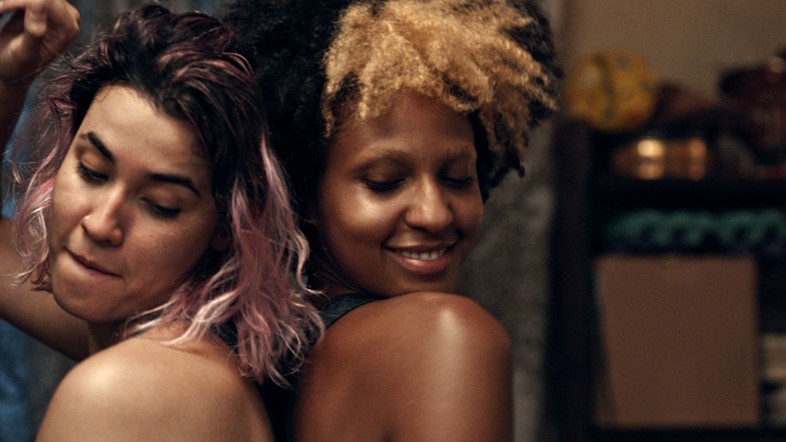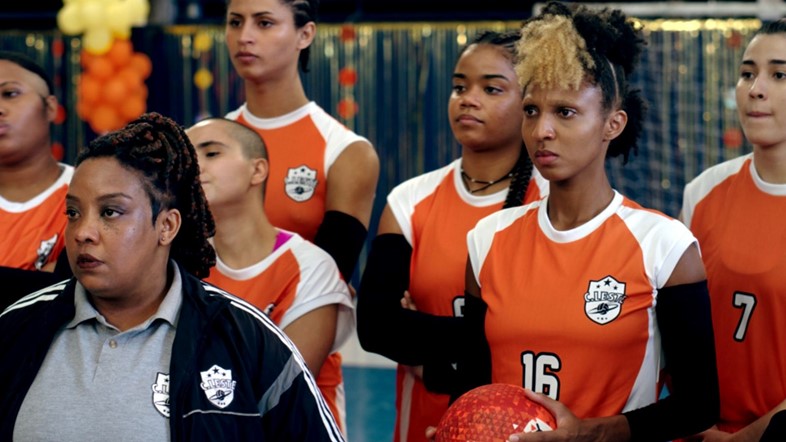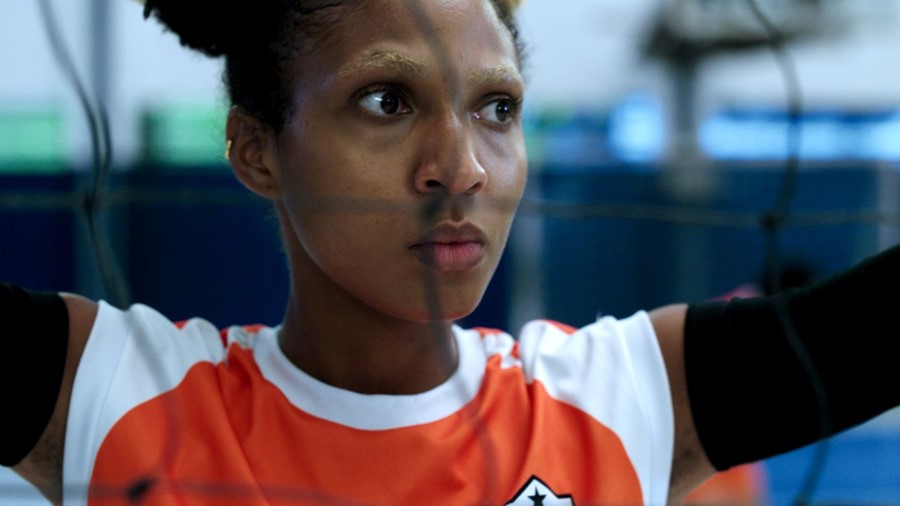Lillah Halla’s debut film is a battered but unbowed fuck-you to the fascist tide that has swept across Brazil over the past decade. Here, she talks about why this film is a “response to political times”
There’s a person whose name Lillah Halla doesn’t wish to speak – let’s just call him ‘JB’ – who would prefer that her film had never been made. In fact he very nearly had his way, when funding was frozen for the Brazilian director’s feature debut in 2016, one of many to fall prey to politically motivated cuts to the country’s beleaguered film industry.
Refusing to give in, Hallah turned to international backers to invest in her film, Power Alley (Levante), a battered but unbowed fuck-you to the fascist tide that has swept across Brazil over the past decade. At its heart is the story of Sofia (Ayomi Domenica), a prodigiously gifted volleyball player at a local São Paolo side for LGBTQ+ kids who is on the brink of a life-changing scholarship. When she discovers she is pregnant, she panics: this is a deeply Catholic country where abortion is illegal, and a recent surge in Christian fundamentalism can make life very unpleasant indeed for those seeking to do so. Narrowly avoiding abduction after a trip to a fake abortion clinic, Sofia confides in her friends who together take a stand for their teammate’s freedom to choose. It’s a great first film, burning with righteous fury but also the pleasures of sisterhood, an outpouring of joy to counter the terrors unleashed by JB.
Below, AnOther caught up with Lillah Halla on the Croisette in Cannes to talk about the project.

Alex Denney: This is a brave choice of subject matter for a first feature. Could you not have made it a bit easier for yourself?
Lillah Halla: Haha, that is very true! I did make it very hard for me. But I guess it’s part of the challenge; you only get back what you put in. Because it was a lot of work to make a film in [Jair] Bolsonaro’s Brazil, let alone a film about this. We actually had funding pre-Bolsonaro – I don’t even like saying his name, let’s just say during the fascist wave – but that was frozen [after he came to power]. We knew we’d never get funding [at home] so that’s when we opened up for international funding. Then the pandemic came so this also delayed the process, and we finally shot in 2022.
AD: How did the idea for the film evolve over that time?
LH: It became a response to the political times we’d been living through, because the way I perceived the world had changed over this time. I realised, for example, how important it was to approach this topic from a collective perspective and not deal with the subject of unwanted pregnancy in a very lonely, tragic [way]. The crisis in Brazil during the last few years has generated a feeling of paralysing depression, and this fear and sadness are political tools of manipulation. The power of this group, the importance of this bond and the joy that it brings, is political.
AD: The chemistry between the cast members in the film is a wonderful thing. How did you set about capturing that energy?
LH: They’re a very tight group now. For me, it was very important to create this bond outside the film as well as inside, and this doesn’t happen by chance; it took us a long time to find the group. Once we got together there were many different things that helped this chemistry – for example, for the first weeks of rehearsal they didn’t have a [proper] script, I brought it back to a [basic] treatment so we could bring their voices into the story. Then we would rewrite scenes based on what they said. There is no reason why I should be the only one [speaking] through their voices. Finding ways in which their histories, ideas, presence and voices merged with the script was very important.
AD: Was it very emotionally demanding?
LH: It was triggering. And not only for the team in front of the camera; there were so many scenes where I would look around and the AD was crying. That’s why we needed to create safe spaces, safe words ... It’s through all this that trust grows and [the cast] could build trust within themselves.

AD: Sofia goes to an illegal abortion clinic which turns out to be a fake clinic run by pro-lifers, which apparently is a real problem in Brazil?
LH: Yeah, they keep themselves secret. But it’s based on real stories.
AD: They say they’ll take Sofia out of the city for a couple of weeks to ‘think things over’, which sounds incredibly sinister. What do they do with people out there?
LH: Well, they probably do different things, because it’s impossible to know how every single one of them works. But the ones we know about, they basically keep the girls until the baby is born.
AD: Shocking. One thing I found depressing to read was Brazil’s new president, social democrat Lula, talking about how he was “against” abortion in the runup to the election.
LH: At first he said he thought [abortion] was a right for everyone and an obligation of the health system, but he was attacked so he stepped back. The same happened to [former Brazilian president] Dilma Rousseff; it’s such a [toxic] subject that it’s very difficult for politicians on the left to really face the issue. And it’s not just Lula; right now we have the whole senate taken by evangelists.
AD: Are politicians reflecting public opinion here or are they just worried about fundamentalists?
LH: Well, first of all those fundamentalists are not a small part of society, and it’s growing very quickly.
AD: Why is this happening now?
LH: I’m not the right person to answer this but I’ve been researching the subject and I would guess it’s the sense of community and belonging. Also right [fundamentalists] are performing a lot of the functions that the state should be doing – for example, in some areas you can only get gynaecological services through the church. Their reach is [huge]. But I don’t want to say it’s only a religion problem, because it’s also a gender violence problem, a class violence problem, an ethnic violence problem as well.
AD: Are you ready for the debate your film seems likely to provoke in Brazil? Do you worry about people’s safety?
LH: You’re never ready! But when you make a film about a taboo political topic, it’s gonna be spoken about and this is the aim of it but we are living through fascist times in Brazil. So I know there will be a polemic, shall we say. But we’re absolutely hoping there is a change and I hope the film can also help raise this debate.
